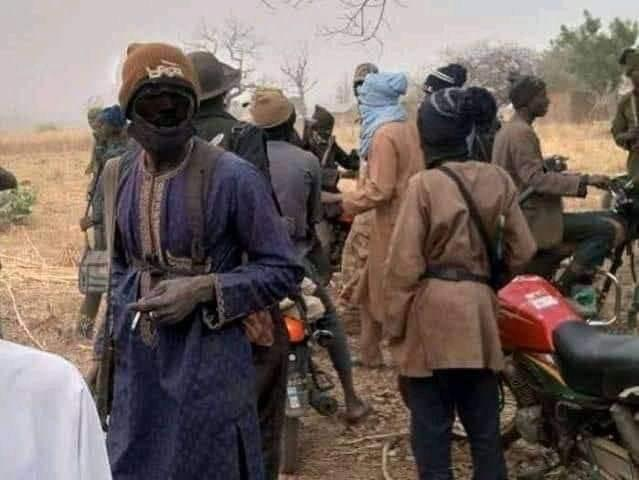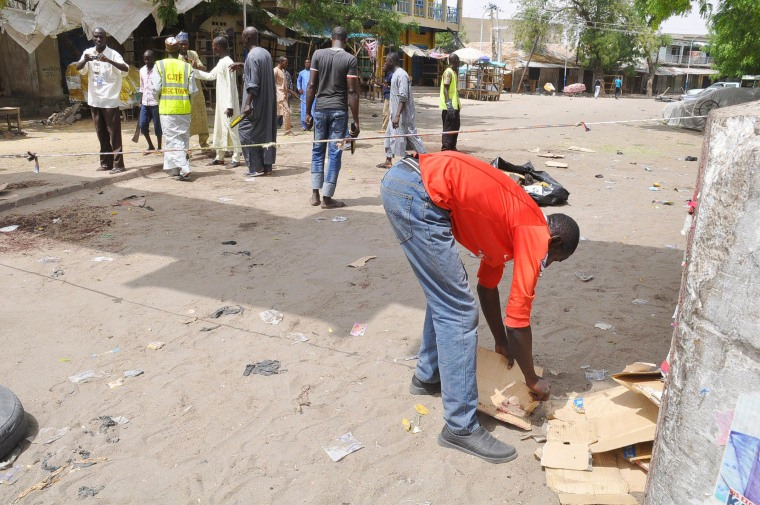The Sokoto airstrike incident has sent shockwaves through the communities of Gidan Sama and Rumtuwa, where a military operation targeting the Lakurawa terrorist group turned tragic. Early reports indicate that a Nigerian military fighter jet, in a bid to neutralize threats in the area, mistakenly struck civilian locations, leading to numerous casualties. Witnesses describe a horrifying scene as bombs fell on the villages around 7 a.m., leaving over ten individuals dead and many others injured. This devastating event, which occurred within the Silame Local Government Area of Sokoto State, has raised serious concerns about the impact of military actions on innocent lives. As details continue to unfold, local leaders emphasize the urgent need for clarity and accountability in such operations to prevent further loss of life.
In a tragic turn of events, the recent military airstrike in Sokoto State has drawn attention to the ongoing conflict involving the notorious Lakurawa group. The attack, which struck the peaceful communities of Gidan Sama and Rumtuwa, highlights the complexities of combating terrorism in Nigeria. Local sources report that the assault, intended to eliminate threats posed by this militant faction, instead resulted in significant civilian casualties. The fallout from this incident not only raises questions about operational protocols but also underscores the humanitarian impact of military engagements in the region. As the community grapples with the aftermath, it becomes increasingly clear that a balance must be struck between national security and the protection of innocent lives.
Understanding the Sokoto Airstrike Incident
The Sokoto airstrike incident has drawn significant attention due to its tragic implications for the local communities of Gidan Sama and Rumtuwa. On Wednesday morning, a Nigerian military fighter jet conducted an operation targeting the Lakurawa terrorist group, which is known for its violent activities in the region. Unfortunately, this military action resulted in the loss of innocent lives, with reports indicating that over ten villagers were killed. The airstrike was reportedly aimed at neutralizing a threat posed by the terrorist group, yet it has inadvertently caused devastation among non-combatants, raising serious questions about the military’s operational strategies in civilian areas.
Local sources have confirmed that the villages affected by the airstrike were situated near Surame Forest, a notorious hideout for the Lakurawa group and associated bandits. The timing of the attack, around 7 a.m., when villagers were beginning their day, adds to the horror of the event. Eyewitness accounts describe a scene of chaos as bombs fell on peaceful communities. The emotional toll on the survivors and the community at large is profound, with many families mourning the loss of loved ones who were simply going about their daily lives.
The Impact of the Rumtuwa Attack on Local Communities
The Rumtuwa attack, part of the broader Sokoto airstrike incident, has had a devastating impact on the local population. The assault not only resulted in immediate loss of life but also inflicted serious injuries on many others. This tragedy has instigated a wave of fear and anxiety among residents, as they grapple with the reality of living in a conflict-prone area. The chairman of Silame LGA, Alhaji Abubakar Muhammad Daftarana, emphasized the peaceful nature of the villagers, highlighting their lack of involvement in any criminal activities. His statement underscores the indiscriminate nature of the airstrike and casts doubt on the effectiveness of such military operations in distinguishing between combatants and civilians.
Furthermore, the repercussions of the attack extend beyond physical injuries and fatalities. The psychological impact on the community is profound, as many residents now live in fear of future military actions. The ongoing assessment of damages, as stated by Daftarana, raises concerns about the long-term implications for community trust in the government and security forces. The incident illustrates the precarious balance that must be maintained when conducting military operations in areas with civilian populations, particularly in regions like Sokoto State, where the threat of terrorism is prevalent.
Government Response to the Sokoto Airstrike Incident
In the aftermath of the Sokoto airstrike incident, the response from government officials has been cautious and measured. ASP Ahmad Rufa’i, the Sokoto State Police Public Relations Officer, distanced the incident from any police operations, signaling a need for clarity and accountability regarding military actions. This response reflects a broader concern among officials about the implications of military engagement in civilian areas, as they try to balance the necessity of counter-terrorism efforts with the safety and security of innocent lives. The lack of coordination between military and police operations highlights the challenges faced by Nigerian authorities in their fight against terrorism.
Moreover, the government’s ongoing assessment of the situation is critical for understanding the full scope of the tragedy. As local leaders and residents seek answers, the need for a transparent investigation into the airstrike becomes imperative. The call for accountability emphasizes the importance of ensuring that military actions do not disproportionately affect civilian populations. As the situation evolves, the government’s response will play a significant role in shaping public perception and trust in their ability to manage security threats while safeguarding the rights and lives of innocent citizens.
Civilian Casualties in Military Operations: A Growing Concern
The civilian casualties resulting from military operations, such as the Sokoto airstrike incident, have become an increasingly alarming issue in Nigeria. The tragic loss of life in Gidan Sama and Rumtuwa has sparked a national and international outcry, highlighting the urgent need for strategies to protect civilians during military actions. As the Nigerian military continues its fight against groups like the Lakurawa terrorist group, the risk of collateral damage raises ethical questions about the conduct of warfare in populated areas. The recent airstrike serves as a stark reminder of the potential consequences of military engagements that fail to prioritize civilian safety.
This growing concern regarding civilian casualties has led to calls for greater accountability and refinement of military protocols. Advocates for human rights emphasize the importance of implementing measures that ensure the protection of non-combatants during operations. As communities like those affected by the Rumtuwa attack seek justice and healing, it is essential for the military and government to adopt a more cautious approach that minimizes harm to innocent lives. The balance between effective counter-terrorism strategies and the preservation of civilian life remains a critical challenge for Nigeria.
The Role of Local Leadership in Crisis Management
Local leadership plays a pivotal role in crisis management during incidents like the Sokoto airstrike. Leaders like Alhaji Abubakar Muhammad Daftarana are essential in coordinating immediate responses, offering support to affected families, and advocating for the community’s needs in the aftermath of such tragedies. Their presence and actions can help restore a sense of normalcy and provide a platform for voicing concerns to higher authorities. In this case, Daftarana’s commitment to assessing the damages and urging for accountability reflects the importance of strong local governance in addressing the fallout from military operations.
Moreover, local leaders can serve as a bridge between communities and government officials, ensuring that the voices of the affected population are heard. They are vital in fostering dialogue and understanding between the military and civilians, advocating for strategies that prioritize the safety and well-being of residents. In times of crisis, the effectiveness of local leadership can significantly influence community resilience and recovery, making it imperative for authorities to empower and support these leaders in their efforts to navigate the challenges posed by violence and insecurity.
The Necessity for Strategic Military Operations
The Sokoto airstrike incident calls into question the necessity for more strategic military operations in Nigeria’s fight against terrorism. While the intent behind targeting the Lakurawa terrorist group was to dismantle their operations, the unintended consequences of civilian casualties highlight the need for improved intelligence and operational planning. Military strategies must evolve to incorporate more precise targeting protocols that prioritize the safety of non-combatants, ensuring that military action does not inadvertently harm innocent lives. This incident serves as a crucial learning opportunity for the Nigerian military to refine their tactics in response to threats.
Additionally, the integration of community input and local intelligence can enhance the effectiveness of military operations. Engaging with local populations provides valuable insights into the dynamics of communities affected by terrorism, allowing for more informed decision-making. By working collaboratively with local leaders and residents, the military can develop strategies that are not only effective in combating terrorism but also respectful of civilian lives. The Sokoto airstrike incident underscores the critical importance of adapting military operations to ensure both security and humanitarian considerations are upheld.
Community Resilience in the Face of Tragedy
The resilience of communities like Gidan Sama and Rumtuwa is put to the test in the aftermath of tragic events like the Sokoto airstrike incident. Despite the pain and loss experienced by these communities, their ability to come together and support one another is a testament to their strength. Local residents are often the first responders in such situations, providing assistance to the injured and comfort to those who have lost loved ones. This communal spirit is vital for healing and recovery as it fosters a sense of solidarity and shared purpose among the affected individuals.
Moreover, community resilience is crucial for rebuilding trust in the face of adversity. As residents navigate the aftermath of the airstrike, their collective efforts can help restore a sense of normalcy and stability. Engaging in community dialogues and initiatives aimed at healing can empower individuals and foster a renewed commitment to peace. The Sokoto airstrike incident, while devastating, also presents an opportunity for communities to reflect on their strengths and build a more resilient future, one that prioritizes safety and mutual support.
The Importance of Media Coverage in Conflict Zones
Media coverage plays a significant role in shaping public perception and awareness of incidents like the Sokoto airstrike. The dissemination of information regarding the tragic events in Gidan Sama and Rumtuwa is essential for holding authorities accountable and ensuring that the voices of affected communities are heard. Accurate reporting can shed light on the realities faced by civilians in conflict zones, influencing public discourse and policy decisions. As seen in the reports by outlets like Daily Trust, responsible journalism highlights the need for transparency and accountability in military operations.
Additionally, media coverage can help mobilize support for affected communities by raising awareness of their plight. By sharing stories of survival and resilience, journalists can draw attention to the human aspect of conflict, encouraging interventions and assistance from governmental and non-governmental organizations. The Sokoto airstrike incident serves as a reminder of the power of media in advocating for justice and accountability while emphasizing the importance of ethical reporting in conflict situations.
Future Implications for Sokoto State and Beyond
The implications of the Sokoto airstrike incident extend beyond the immediate tragedy, influencing future military and security strategies in Sokoto State and across Nigeria. As the government grapples with the fallout from civilian casualties, there is a pressing need for policy reforms that prioritize the protection of non-combatants during counter-terrorism operations. The incident serves as a critical juncture for the Nigerian military to reassess its approach to engagement in civilian areas, emphasizing the need for strategies that minimize harm to innocent lives while effectively addressing security threats.
Furthermore, the Sokoto airstrike incident may have broader ramifications for community relations with security forces. If local populations feel that military operations endanger their safety rather than protect it, trust in government initiatives may erode. This underscores the importance of fostering cooperation between communities and security agencies, ensuring that military actions are conducted with a commitment to civilian safety and welfare. As Nigeria continues to face challenges from groups like the Lakurawa terrorist group, the lessons learned from this incident will be crucial in shaping a more humane and effective approach to national security.
Frequently Asked Questions
What happened during the Sokoto airstrike incident in Gidan Sama and Rumtuwa?
The Sokoto airstrike incident occurred on Wednesday morning when a Nigerian military fighter jet targeted the Lakurawa terrorist group in the communities of Gidan Sama and Rumtuwa. Unfortunately, this airstrike resulted in the deaths of several villagers and injuries to many others.
Who were the victims of the Sokoto airstrike incident?
The victims of the Sokoto airstrike incident were innocent villagers in Gidan Sama and Rumtuwa, who were reportedly sitting peacefully when the bombs fell. Local authorities, including Alhaji Abubakar Muhammad Daftarana, emphasized that these individuals had no criminal records and were simply peace-loving residents.
What has been reported by local sources regarding the Sokoto airstrike incident?
Local sources reported that the Sokoto airstrike incident targeted the Lakurawa terrorist group around 7 a.m. on Wednesday. Eyewitness accounts indicate that over 10 individuals were killed, and many others sustained injuries as a result of the military action.
How did the Sokoto State government respond to the airstrike incident?
The Sokoto State government, represented by Alhaji Abubakar Muhammad Daftarana, the chairman of Silame LGA, confirmed the incident and mentioned that an assessment of the damages is ongoing. He expressed concern for the innocent villagers affected by the airstrike.
Was the Sokoto airstrike incident related to police operations?
According to ASP Ahmad Rufa’i, the Sokoto State Police Public Relations Officer, the Sokoto airstrike incident was not connected to any police operations. The military action was focused on the Lakurawa terrorist group and unfortunately impacted local civilians.
What is known about the Lakurawa terrorist group in relation to the Sokoto airstrike incident?
The Lakurawa terrorist group is known to operate in the region near Surame Forest, which has been identified as a hideout for both the group and local bandits. The Nigerian military airstrike aimed to target this group, but it inadvertently affected nearby innocent communities during the operation.
What ongoing assessments are being conducted after the Sokoto airstrike incident?
Following the Sokoto airstrike incident, local authorities are conducting assessments to determine the full extent of the damages and casualties. Alhaji Abubakar Muhammad Daftarana has indicated that it is too early to provide an exact number of casualties as the situation is still being evaluated.
What were the conditions in the communities affected by the Sokoto airstrike incident before the attack?
Prior to the Sokoto airstrike incident, the communities of Gidan Sama and Rumtuwa were described as peaceful, with residents living without any criminal entanglements. The sudden military action disrupted their calm, leading to tragic consequences.
| Key Point | Details |
|---|---|
| Targeted Communities | Gidan Sama and Rumtuwa, located in Silame LGA, Sokoto State. |
| Time of Incident | Around 7 a.m. on Wednesday. |
| Nature of Incident | Nigerian military fighter jet airstrike targeting the Lakurawa terrorist group. |
| Casualties | Reports indicate over 10 dead and many injured. |
| Local Response | Malam Yahya noted peaceful villagers were attacked; ongoing damage assessment by Alhaji Abubakar Muhammad Daftarana. |
| Official Statement | Sokoto State Police stated the incident was not linked to police operations. |
Summary
The Sokoto airstrike incident has highlighted the tragic consequences of military operations in civilian areas. On Wednesday morning, airstrikes aimed at the Lakurawa terrorist group inadvertently targeted the peaceful communities of Gidan Sama and Rumtuwa, resulting in significant loss of life and injuries among innocent villagers. Local authorities have expressed their shock and sorrow at the event, emphasizing the need for thorough assessments and accountability. As investigations continue, the incident serves as a stark reminder of the complexities and impacts of military actions in regions plagued by insecurity.


